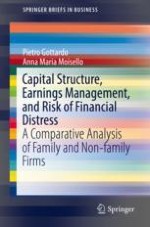
2019 | OriginalPaper | Buchkapitel
3. Family Influence, Leverage and Probability of Financial Distress
verfasst von : Pietro Gottardo, Anna Maria Moisello
Erschienen in: Capital Structure, Earnings Management, and Risk of Financial Distress
Aktivieren Sie unsere intelligente Suche, um passende Fachinhalte oder Patente zu finden.
Wählen Sie Textabschnitte aus um mit Künstlicher Intelligenz passenden Patente zu finden. powered by
Markieren Sie Textabschnitte, um KI-gestützt weitere passende Inhalte zu finden. powered by